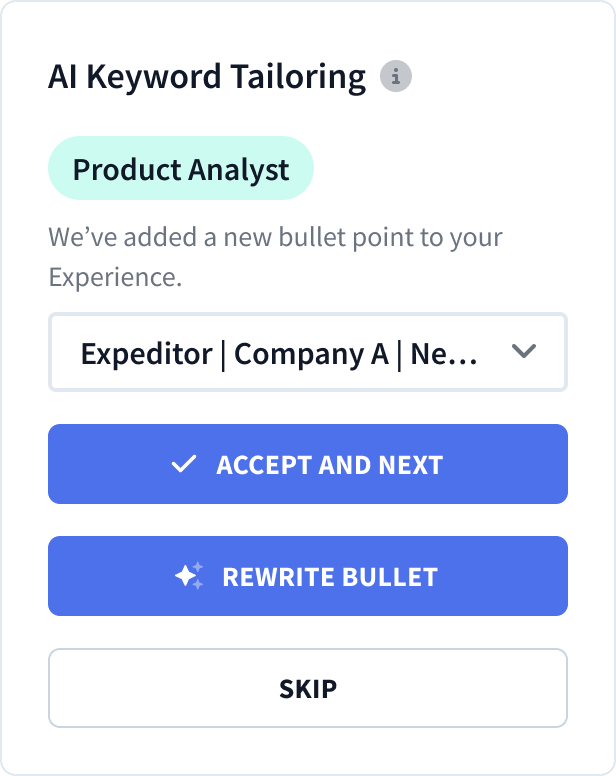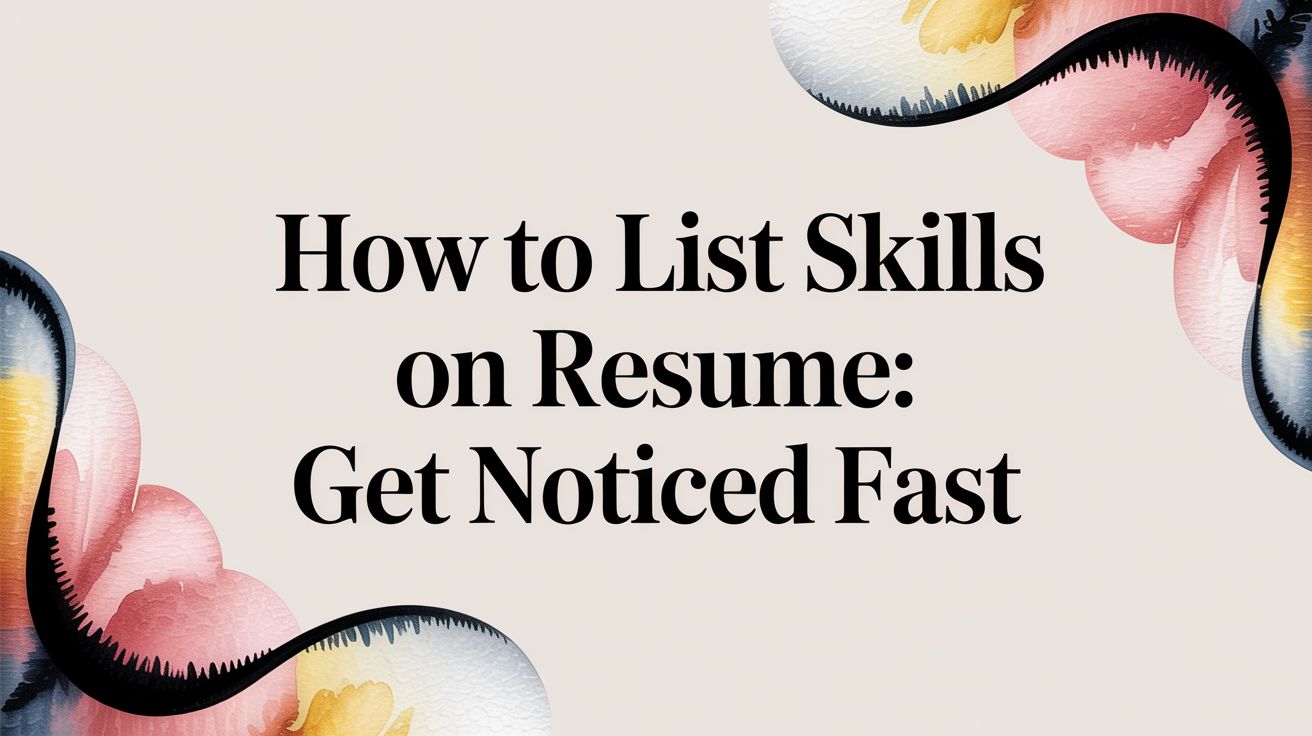40+ intelligent questions to ask at the end of an interview
The moment when an interviewer asks, "Do you have any questions for me?" can make or break your candidacy. But, some job seekers may pass up this opportunity entirely—or ask generic questions that fail to demonstrate their genuine interest and strategic thinking. If you want to feel even more prepared for this stage, you can also use these essential resume tips to boost your chances of landing interviews in the first place.
This comprehensive guide provides you with these carefully crafted questions to ask at the end of an interview so you can leave a lasting impression, showcase your value, and stand out from other candidates.
Why asking great questions at the end of an interview matters
It’s important to demonstrate your genuine interest in the role and company, which can be shown through which questions you ask. This is also a good way to showcase your ability to think critically about the opportunity.
Beyond impressing interviewers, you can gain valuable intelligence about the role, team dynamics, and company culture that aren’t found in job descriptions. This information helps you make informed decisions about whether to accept an offer and sets realistic expectations for the potential new position.
Best questions to ask at the end of an interview
The following questions are strategically organized to help you gather comprehensive information while positioning yourself as a thoughtful, engaged candidate. Each question serves a specific purpose in helping you evaluate the opportunity and demonstrate your professional maturity.
Questions about the role and the company
These questions show you’ve done your homework and are genuinely interested in how the role fits into the bigger picture. They help you get clarity on expectations, team structure, and how your work will make an impact.
- What does a typical day or week look like in this role?
This question reveals the reality behind job descriptions and helps you visualize your potential daily experience.
- What are the key challenges someone in this position would face?
Understanding obstacles upfront demonstrates your realistic approach and problem-solving mindset.
- What are the main priorities you’d like to see someone in this role accomplish in the first 90 days?
This shows your focus on immediate impact and helps you understand success metrics from day one.
- Is this a newly created position, or am I filling an existing role? If the latter, why did the previous person leave?
This context helps you understand role stability and potential challenges you might inherit.
- What tools or technologies does the team rely on most?
Technical requirements often extend beyond job descriptions, and this shows your practical interest in execution. It can also bring a focus to daily responsibilities, success metrics, team dynamics and resource availability.
- Can you tell me about the team I’d be working with?
Team dynamics significantly impact your job satisfaction and success, making this insight invaluable.
- How does the team prefer to communicate and collaborate?
Understanding communication styles helps assess cultural fit and work preferences.
- What does the onboarding process look like?
This shows you're thinking ahead and are serious about setting yourself up for success. It also gives you insight into how the company supports new hires and prepares them for their role.
- How is performance typically measured here?
This question helps you understand what success looks like in the role and how your contributions will be evaluated. It also shows that you're goal-oriented and eager to meet (or exceed) expectations.
- How often are feedback and formal performance reviews conducted?
This shows that you're invested in your growth and want to understand how often you'll receive input to help you improve and stay aligned with expectations.
- What products or services are currently driving the most growth for the company?
Asking this demonstrates business curiosity and identifies where the company is focusing its energy. It also pinpoints where you’ll be able to make the biggest impact.
- Where do you see the company a year from now?
This question gives you insight into the company’s short-term vision and priorities, helping you assess how your role might evolve with it.
- What do you see as the strengths of someone who would excel in this role?
By asking this, you show that you're aiming to go beyond the basics and understand what qualities truly drive success in the position.
- What’s the leadership style like here?
Understanding leadership style helps you gauge how decisions are made, how feedback is given, and whether the environment supports your preferred working style.
- What is the next step in your hiring process, and when can I expect to hear back?
This shows you're proactive and respectful of timelines while also giving you clarity on what to expect after the interview.
- Is there anything you’re concerned about in my background or experience that I could clarify or address?
Asking this shows confidence, openness to feedback, and a willingness to engage directly with potential concerns—all of which reflect professionalism and self-awareness.

Showcase your best experiences with Resumatic resumes.
Questions that position yourself for growth
These questions show you're thinking long-term and eager to grow within the company. They demonstrate curiosity, ambition, and a genuine interest in how you can contribute beyond the role you're applying for.
- What does professional development look like here?
This question signals that you're motivated to grow and want to understand how the company invests in its people. It also gives insight into training programs, mentorship, and potential career paths.
- How do you support continuous learning and upskilling for employees?
This shows your commitment to staying current and improving your capabilities.
- Are there clear career growth paths for this role?
Asking about advancement opportunities helps you assess your long-term potential within the company. It also gives insight into available learning programs, career growth paths, mentorship opportunities, and internal mobility.
- Can you share examples of how someone has progressed in their career from this team?
This helps you understand real growth paths within the team and signals your interest in long-term development and internal advancement.
- How does the company invest in helping employees reach their long-term goals?
Asking this shows you're thinking beyond the role and want to align your career aspirations with the company’s support systems and resources.
- How do you handle internal mobility or opportunities to move into new roles?
This question demonstrates your desire to grow within the organization and helps you evaluate whether the company encourages cross-functional development.
- What opportunities are there for mentorship or coaching?
It shows you're eager to learn from others and grow your skill set, while giving insight into the kind of support and knowledge-sharing culture you can expect.
- How does leadership help team members navigate their career paths?
This helps you understand how invested leaders are in employee growth and whether there’s structured guidance or advocacy for advancement.
- How does the company approach succession planning?
This question gives you a sense of how seriously the company takes employee development and whether they actively prepare people for future leadership roles.
- What skills or experiences would you like to see someone develop over their first year here?
It shows you're forward-thinking and eager to succeed, while helping you understand what growth is expected and supported in the role.

Showcase your skills with Resumatic’s resume builder.
Questions to determine cultural fit
These questions help you understand what it's really like to work at the company day-to-day. They show you're looking for more than just a job—you want to be part of a team where you’ll thrive and feel aligned with the company’s values.
- How would you describe the company culture in a few words?
This gives you a quick, high-level view of the company’s environment and helps you assess whether it aligns with your working style and values.
- What does the company do to foster diversity and inclusion?
It shows that you care about equity and belonging and want to join a workplace that actively supports diverse perspectives and backgrounds.
- How do you keep employees engaged and motivated?
Employee engagement strategies reveal management priorities and the quality of the work environment. This should provide you insight on the company’s work-life balance, communication style, recognition practices and conflict resolution.
- What are some highlights of working here that employees often mention?
This helps you uncover what people genuinely enjoy about the company and offers insight into day-to-day experiences beyond the job description.
- What’s your favorite thing about working at this company?
Asking this invites a personal and honest perspective, helping you gauge enthusiasm and satisfaction directly from someone on the inside.
- How does the organization support work-life balance?
It shows you're thoughtful about sustainability in your work and helps you understand how the company respects employees' time and well-being.
- How does the company celebrate wins or recognize employees’ contributions?
This reveals whether the company values appreciation and recognition, which are key indicators of a supportive and motivating work environment.
- How do teams stay connected, especially if some members work remotely or in hybrid setups?
This shows you're mindful of collaboration and want to understand how the company builds team cohesion in flexible work settings.
- What qualities do people who thrive here usually have?
It helps you determine whether your working style and strengths match the company’s culture and expectations for high performers.
- How are employees encouraged to bring their authentic selves to work?
This reflects your interest in workplace wellbeing and belonging, and it gives insight into how inclusive and open the culture really is.
- How does the team handle disagreements or conflicts?
It shows you value communication and transparency, and it helps you learn how the team manages challenges and maintains trust.
- Can you share an example of how the company lived up to its values recently?
This reveals how the company values shape real decisions and behavior.
- What does success look like for someone in this role, both from a performance standpoint and culturally?
It shows you're aiming to meet expectations holistically in how you contribute to team dynamics and company culture.
Additional tips for asking end-of-interview questions
Strategic questioning requires more than just having good questions. You need to execute them effectively to maximize their impact on your candidacy. Question delivery and timing are just as important as content.
1. Avoid ‘yes’ or ‘no’ questions
Open-ended questions generate more valuable information and demonstrate your ability to engage in meaningful dialogue. Instead of asking "Do you like working here?" Try "What do you enjoy most about working here?" to encourage detailed responses that provide genuine insights.
2. Stay away from certain topics
Avoid questions about salary, benefits, vacation time, or company perks during initial interviews unless the interviewer brings them up first. These topics can make you appear more interested in what the company can do for you rather than what you can contribute to their success.
Topics to avoid in early interviews:
- Compensation details: Salary, bonuses, and financial benefits
- Time off policies: Vacation days, sick leave, and personal time
- Company perks: Free meals, gym memberships, and recreational activities
- Negative inquiries: Complaints about previous employers or critical company feedback
- Limit yourself to a few questions
Quality trumps quantity when it comes to interview questions. Choose 2-3 questions that matter most to your decision-making process and allow adequate time for thorough answers rather than rushing through a lengthy list.
4. Research before you ask
Never ask questions that could be answered through basic company research or information readily available on their website. This demonstrates poor preparation and wastes valuable interview time.
5. Listen actively and follow up
Pay attention to answers and ask thoughtful follow-up questions when appropriate. This shows your genuine engagement and can lead to more detailed insights that help you make better decisions about the opportunity.
Score more interviews with an optimized resume
While asking great questions can help you stand out during interviews, getting to that interview stage requires a resume that passes both ATS screening and human review. Many qualified candidates never get the chance to showcase their interview skills because their resumes do not make it past the initial screening processes.
Resumatic's AI-powered platform helps you create ATS-compatible resumes that highlight your qualifications effectively while incorporating relevant keywords that hiring managers are seeking. It’s optimized for both new and older ATS systems, generates strong phrasing using expert-trained AI, tailors your resume to job descriptions, and even offers a resume score plus monthly reviews from real resume experts.
It’s completely online, easy to use, and built to help you land real interviews—not just look good on paper.



